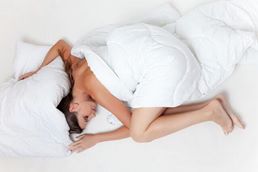Sleep is vital not only to help you recharge and recover from a full day but also to gives you the ability to function at your best the following day. Lack of sleep is linked to reduced ability to control your appetite and often leads to overconsumption of food . This can ultimately leas to a larger waistline.
Sleeping less than 5 hours can increase how much you eat by up to 15% compared to if you had around 6-8 hours or adequate sleep for your needs. Other unhelpful side effects of poor quality sleep can be inability to think and remember clearly, reduced immune function, and lower rate of metabolism.
When you do not get enough sleep over a longer time frame the way your body can use carbohydrate is negatively affected. Also, your body's ability to make new proteins is reduced. So how can you eat your way to a better sleep? Try these simple additions to your last meal before bed and see if they help you drift off to dreamland faster and achieve a more restful sleep.
- Be mindful of your last cup of coffee.
Coffee has a half-life (half the caffeine still running through your system) of around 5 - 7 hours. Do the math's and count backwards to work out when your last cup of coffee should be. Remember tea (which includes white, black and green) has about half the caffeine content as a regular cup of coffee. Other caffeinated foods and beverages include foods like chocolate and protein bars and soda like coke.
- Alcohol is not your friend.
You may be thinking that alcohol makes you want to hit the pillow fast. Yes, alcohol may have the effect of making you drowsy and want to sleep but the quality of this sleep is low. You will not have you jumping out of bed the following morning.
Limit your alcohol if possible to only drinking on occasion and remember for health aim to drink no more than 2 standard drinks a day with a total of 10 standard drinks a week. On any special occasion aim for no more than 4 standard drinks in one sitting.
Alcohol can add extra unnecessary energy to your diet with limited positives for your health. If possible, try to go most days of the week without alcohol and if you don’t drink there is no reason for your health to start.
Try to include these foods in a small meal or snack around between 1-3 hours before bed.
- A carbohydrate which does not have very high fibre content like half a cup of white rice or pasta or a piece of rye bread. Low energy releasing carbohydrates do not help sleep as well as the fibre can stay in your guts longer making going to sleep a challenge.
- Stay away from the fatty foods so a burger and chips are not the go to meal.
- Aim to include some protein. A serve of turkey breast will give your body not only protein, but an amino acid called tryptophan which has been linked to improved sleep.
- Add some cherries for the sleep-inducing effects of melatonin.
A great meal combination could be a piece of rye bread with some roasted turkey breast and few crushed cherries on top for sweetness to act as a cranberry sauce alternative.
Take home message:
You may be in two minds about eating close to bedtime but going to sleep hungry will leave you tossing and turning all night. This habit can also lead to other unhealthy habits like late night snacking on the sometimes foods like chips and chocolate. Try these tips to eat for your best night's sleep.








